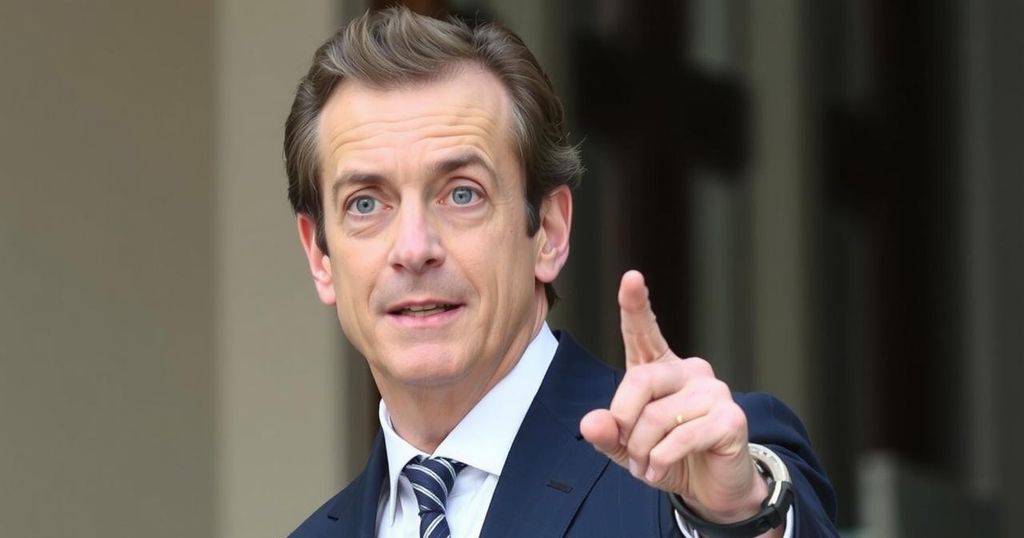Trial of Nicolas Sarkozy: Allegations of Gaddafi-Linked Election Funding
Nicolas Sarkozy has begun trial proceedings in Paris over allegations of accepting illegal funds from Muammar Gaddafi for his 2007 election campaign. Prosecutors claim he promised assistance to Gaddafi concerning his international image. Sarkozy denies all accusations, which surfaced following Saif al-Islam’s claims in 2013. The trial includes twelve co-defendants, and if convicted, Sarkozy could face up to ten years in prison. The trial is set to continue until April 10.
Former French President Nicolas Sarkozy has commenced trial proceedings in Paris, facing allegations of receiving millions in illicit funds from the late Libyan leader Muammar Gaddafi to support his successful 2007 electoral campaign. Prosecutors assert that Sarkozy provided assurances to assist Gaddafi in ameliorating his international reputation in exchange for the financial support. Sarkozy, who served as president from 2007 until 2012, has consistently refuted the accusations, positing that these charges stem from individuals seeking to undermine him.
The investigation into these claims initiated in 2013, following statements from Saif al-Islam, Gaddafi’s son, who asserted that his father had financially supported Sarkozy’s campaign. Subsequently, Lebanese businessman Ziad Takieddine, known for his connections between France and the Middle East, claimed to possess written evidence indicating that Sarkozy’s presidential campaign received “abundant” funding from Libya, which persisted even during Sarkozy’s presidency.
Alongside Sarkozy, twelve co-defendants who allegedly orchestrated the arrangement with Gaddafi are also facing trial, all maintaining their innocence. Additionally, Sarkozy’s wife, Carla Bruni-Sarkozy, has been charged with concealing evidence related to the Gaddafi investigation and collaborating with wrongdoers to commit fraud, charges she vehemently denies.
Since his electoral defeat in 2012, Sarkozy has been embroiled in multiple criminal investigations. Most notably, he is appealing a conviction related to excessive campaign expenditures during his 2012 re-election attempt, which resulted in a one-year prison term, six months of which were suspended. Furthermore, Sarkozy made history by becoming the first former president of France to receive a custodial sentence in 2021 for attempting to bribe a judge in a separate case, and he was granted the ability to serve this sentence at home.
As he appeared in court, Sarkozy was not wearing an electronic monitoring device, although it is expected that he will do so as the proceedings advance. The trial is projected to extend until April 10, and if found guilty, Sarkozy could face a maximum sentence of ten years’ imprisonment.
The trial of Nicolas Sarkozy emerges from allegations of corrupt electoral practices during his 2007 presidential campaign, specifically concerning funding from the regime of Libyan leader Muammar Gaddafi. This case symbolizes broader issues of political integrity and financial transparency within French politics. The trial not only seeks to address the veracity of Sarkozy’s actions but also raises questions about the influence of foreign funds in national elections, reflecting on Sarkozy’s legacy and the integrity of French political practices.
In conclusion, the trial of Nicolas Sarkozy presents significant implications for both his personal legacy and the political landscape of France. This case not only focuses on Sarkozy’s alleged misconduct but also sheds light on the underlying issues of foreign influence and electoral integrity. The outcome of the trial, which may lead to substantial legal repercussions for Sarkozy and his associates, will be closely watched by both domestic and international observers.
Original Source: www.bbc.com




Post Comment